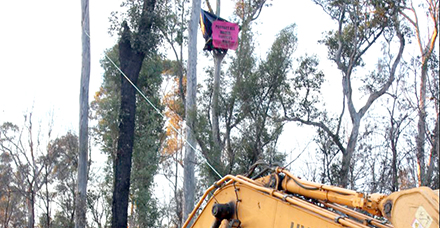Australia’s Regional Forest Agreements are under attack like never before. So far this year the forestry industry has had two successes in two states in cases which, had the environmental lobby been successful, had the potential to derail the RFAs Australia-wide.
After failures in Victoria and Tasmania, the environmental lobby has now shifted its focus to New South Wales.
The Environmental Defenders Office is heading to the Federal Court to challenge the RFA in New South Wales.
Originally signed between the Commonwealth and New South Wales in 2000, it was renewed in 2018 for another 20 years with rolling extensions that could continue indefinitely.
The North East RFA covers timber harvesting in the coastal area between Sydney and the Queensland border. It exempts harvesting in native forests from federal biodiversity law.
But it doesn’t exempt the industry from almost similar – in some cases tighter – regulations in the RFA.
The environmental lobby loves to portray RFAs as a licence to rip the forests to pieces because of the exemption from federal biodiversity law.
That is simply not true, but that argument doesn’t seem to get a lot of traction in mainstream media.
The pending NSW case differs remarkably from the Victorian and Tasmanian cases.
In May this year VicForests successfully appealed against restrictions imposed on its operations by the Federal Court last year.
Appeal Justices Jayne Jagot, John Griffiths and Sarah Derrington determined VicForests’ forestry operations covered by RFAs provide all the environmental protections required by national environmental laws.
They said the original judge in the action, brought by the Friends of the Leadbeater’s Possum, erred in finding forestry operations needed to comply with RFAs to remain exempt from the Environment Protection and Biodiversity Conservation Act.
Then in June the Bob Brown Foundation failed in its High Court bid aimed at overturning Tasmania’s RFA. In a legal challenge dubbed the “Great Forest Case“, Dr Brown’s foundation had sought leave to appeal a Federal Court judgement that agreed with Sustainable Timber Tasmania that there is a broader suite of environmental protections in force in Tasmania.
The foundation argued Tasmania’s RFA was invalid because it did not properly protect threatened native animals.
The one similarity on both cases were that they were largely based around the protection of possibly endangered wildlife.
This is where the difference lies. In NSW the Environmental Defenders Office is basing its case on allegations of faulty science.
The EDO, acting on behalf of the North East Forest Alliance, will argue that the scientific assessment undertaken in the lead up to the RFA renewal in 2018 was based on mid-1990s assessments of biodiversity and not upgraded to account for climate change, endangered species listings and so on.
They will, it is believed, contend that the assessments done in the run up to 2018 were rudimentary, without good scientific basis and using all contemporary science.
EDO Chief Executive Officer David Morris claims the Commonwealth “didn’t want to incur the costs of conducting a proper assessment, waving through a 20-year extension of native forest logging without proper scrutiny”.
It is the first legal challenge to an RFA in New South Wales and is believed to have taken three years to prepare the case.
In May, the Senate agreed to recommended changes to the RFAs framework to give operational certainty that the native forest industry has been seeking.
The codification of those changes cannot come quickly enough.






